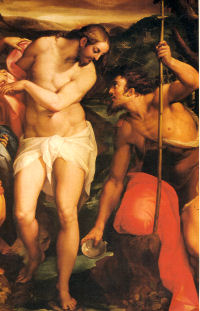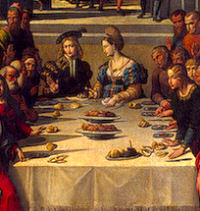Make your gift today!
Help keep Catholics around the world educated and informed.
Already donated? Log in to stop seeing these donation pop-ups.
» Enjoy our Liturgical Seasons series of e-books!
The next day he saw Jesus coming toward him and said, "Behold, the Lamb of God, who takes away the sin of the world. He is the one of whom I said, 'A man is coming after me who ranks ahead of me because he existed before me.' I did not know him, but the reason why I came baptizing with water was that he might be made known to Israel." John testified further, saying, "I saw the Spirit come down like a dove from the sky and remain upon him. I did not know him, but the one who sent me to baptize with water told me, 'On whomever you see the Spirit come down and remain, he is the one who will baptize with the holy Spirit.' Now I have seen and testified that he is the Son of God (Jn 1:29-34)."
 The Week of Prayer for Christian Unity
The Week of Prayer for Christian UnityToday's theme is Pray without ceasing for the conversion of hearts. "Admonish the idlers, encourage the faint-hearted" (1 Thessalonians 5, 14).
In the beginning and at the heart of the ecumenical enterprise can be found a pressing call to repentance and to conversion. We sometimes need to know how to call each other to task within our Christian communities as Paul invites us to do in the first epistle to the Thessalonians. If one or the other causes division, he should be rebuked; if some are afraid of all that a difficult reconciliation could imply, they should be encouraged.
Prayer
Lord you desire truth deep-down within us: in the secret of our hearts, you teach us wisdom. Teach us to encourage each other along the road to unity. Show us the conversion necessary for reconciliation. Give to each of us a new, truly ecumenical heart, we pray you. Amen.
Sunday Readings
The first reading is taken from the Book of the Prophet Isaiah 49:3, 5-6 and is the second of the "suffering servant" prophecies, found in Isaiah. These were prophecies uttered during the Babylonian exile to encourage the Jewish exiles to persevere in their trust in Yahweh, who would soon liberate them from Babylon, and eventually send them the long-expected Messiah, promised to Abraham.
The second reading is from the first Letter of Saint Paul to the Corinthians 1:1-3. The opening verses of this letter have been chosen for the reading because they show the prophecy, read in the first lesson, as fulfilled among the pagans, as well as emphasizing the purpose of the Messiah's coming: the sanctification and true enlightenment of all nations.
The Gospel is from St. John 1:29-34. At last the promise, made to Abraham when God commanded him to leave his home, his country, and his kin (Gen. 12: 1-3), was fulfilled. The Messiah who would bring blessings to Jew and Gentile (to all mankind) had arrived. Eighteen hundred years of expectation had at last come to an end. During these long years of waiting, God had, through his prophets and through his prophetic actions, renewed the hope in the hearts of his Chosen People. These prophecies and prophetic actions had given indications that the expected one would be someone very close to God, someone who was more than a mere man. Yet, who among the Chosen People could ever have thought that the "Promised One" would be the very Son of God in human nature?
His contemporaries, when he came, refused to believe this truth even though Christ had, during his public ministry, made claims to equality with God the Father, and had proved these claims by miracles.
But we must try to understand how difficult for a strict monotheistic Jew were the thought of three persons in God (the Trinity), and the idea that the infinite God could be in a limited, finite, human nature (the Incarnation). Our Lord himself showed that he understood their lack of faith, when he said on the cross : "Father, forgive them for they know not what they do" (Lk. 23 : 24).
 We, however, have no reason for any such doubts or scruples. The full story of Christ's conception, birth, life, preaching and miracles, crowned by his death on the cross and his glorious resurrection, is in itself sufficient guarantee and proof that he was indeed the Son of God-made-man for our sakes. The spread of his Church among the Jews and Gentiles is another convincing proof. What sane man would accept self-mortification, undergo trials and hardships, even martyrdom, or give up all the attractions and pleasures of the body, if he were not convinced that the story of Christ, and therefore his gospel-message, were true?
We, however, have no reason for any such doubts or scruples. The full story of Christ's conception, birth, life, preaching and miracles, crowned by his death on the cross and his glorious resurrection, is in itself sufficient guarantee and proof that he was indeed the Son of God-made-man for our sakes. The spread of his Church among the Jews and Gentiles is another convincing proof. What sane man would accept self-mortification, undergo trials and hardships, even martyrdom, or give up all the attractions and pleasures of the body, if he were not convinced that the story of Christ, and therefore his gospel-message, were true?
The sad part is that, while we have every reason, in this world and the next, to believe in Christ and follow his teaching, so many nominal Christians live as if Christ himself had never lived and died for them. Their hearts are centered in the pleasures, the power and the wealth of this earth. These are passing things, which they will have to bid goodbye very soon. They devote their energies to getting all this world can give them. Its final gift to them will be a six-feet-by-three hole in the earth.
If we neglect our vocation as Christians, if we forget God's infinite love for us, as shown in the Incarnation, and if we fail to learn the lesson he taught us: that our purpose in this short life is to earn the eternal life after death, we, too, could become renegades to Christianity, traitors to Christ and our own greatest enemy.
Christ came to make us his brothers and children of the heavenly Father. He came to die for us so that we could live forever. We can deny our heaven-sent brother, we can leave our father's home, we can lose the eternal happiness that Christ has won for us. God forbid that we should ever be so foolish, so ungrateful to God and Christ, and so inimical to our own real self-interest. — Excerpted from The Sunday Readings Cycle A, Fr. Kevin O' Sullivan, O.F.M.






